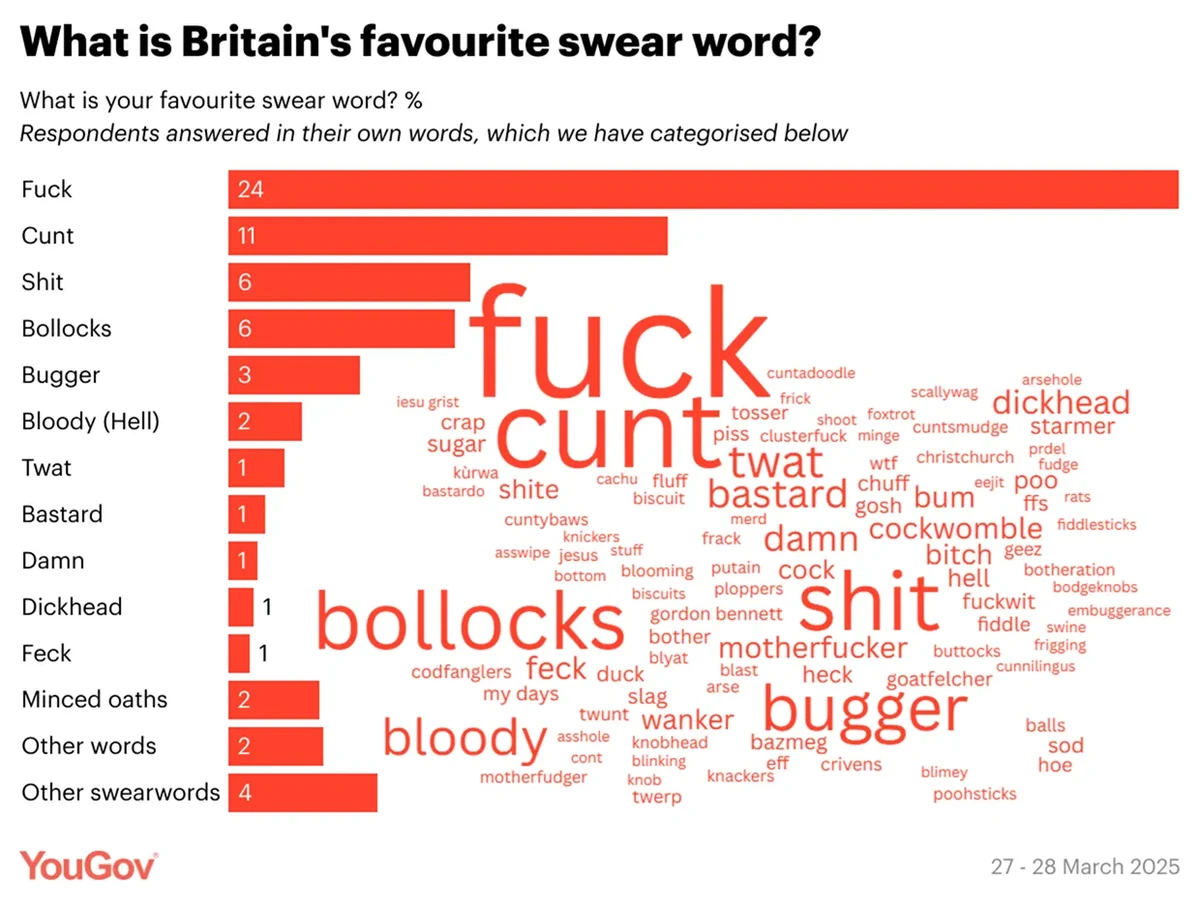57% of Britons say they swear at least most days, and young Britons are now more likely to have a positive than negative view of swearing
Please note, this article and poll contains language that some may find offensive
Swearing can be a difficult subject. For some, it is just another way of expressing yourself; for others, it is typically beyond the pale.
But while it might be controversial, swearing is something that we nearly all do, with just 8% of Britons claiming to never swear. Most Britons (57%) say they swear most days, including 37% who reckon they swear every day.
Men tend to be more regular swearers than women, with 41% saying they swear every day, compared to 33% of women. Younger Britons are also more likely to regularly curse, with 47% of 18-34 year olds swearing every day, compared to just 19% of over 65s.
Despite its controversial nature, just a third of Britons (33%) have an outright negative view of swearing. Although this is roughly twice the one in six (17%) with an explicitly positive view of ‘bad language’, nearly half of the public (48%) have a neutral attitude towards swearing.
There is again a clear generational shift in attitudes, with older Britons the most likely to have a negative view of swearing (51%), a figure which falls with each age group to just 21% among 18-34 year olds. Indeed, this latter group are more likely to have a positive view of swearing (30%) than a negative one.
When do Britons think it is acceptable to swear?
But regardless of people’s general view of swearing, few would dispute that the appropriateness of swearing depends on the situation.
Britons are largely agreed that it is acceptable to swear when you’re in your home by yourself (91%), in response to physical pain (87%) or when you’re with friends in private (86%). Likewise, they are largely agreed that it is unacceptable to swear in a place of worship (91%), while with a customer or client at work (94%), in front of children (95%) or at shopworkers (97%).
There are some instances, though, where the public are more divided. When it comes to being with friends in a public place, Britons are near evenly split between the 51% who think it’s acceptable to swear and the 47% who see it as unacceptable. Similarly, when you’re with colleagues at work, nearly half (45%) see swearing as okay, while 53% see it as not on.
Most Britons (53%) feel it is acceptable to swear at a football match, though 38% say this is unacceptable.
In the cases where there is a clear divide among Britons, it is younger Britons who tend to see swearing as more acceptable. While fully three quarters 18-34 year olds (73%) say it is okay to swear with friends in public, this falls to just 22% of those aged 65 and over.
And when it comes to swearing at work, those generations of Britons who are typically still present in the workplace – i.e. those under the age of 65 – are much more likely to say swearing is acceptable (45-52%) than the over-65s (34%).
Britons still support the watershed for foul language
Since the 1964 Television Act, a 9pm watershed has been instituted on British TV to prevent children seeing unsuitable content, including swearing. Six decades later, this line in the sand for ‘foul language’ is still implicitly supported by Britons, who see swearing on TV before 9pm as unacceptable by a margin of 69% to 27%, but acceptable after 9pm by a margin of 77% to 20%.
Once again, there is an age divide, with 42% of 18-34 year olds believing it is acceptable to swear on TV before 9pm, compared to just 11% those aged 65 and over, while 43% of over 65s feel it still unacceptable to swear after 9pm, relative to only 10% of 18-34 year olds.
Some feel an exception to the watershed can be granted for news programming, with half of Britons (49%) believing it is acceptable for the news to quote a swear word before the watershed, although 42% disagree.
How offensive do Britons find particular swearwords to be?
Not all swear words are equal – most would accept that calling somebody a ‘wanker’ has more venom behind it than calling someone a ‘jerk’. But how do the British public assess the relative strengths of common swear words?
Of the 48 swear words polled (and answered by the 94% of Britons who said they were happy to answer questions containing swear words), ‘cunt’ is seen is the most offensive, with eight in ten (82%) identifying it as very or fairly offensive, including a majority (53%) saying it is ‘very offensive’.
‘Motherfucker’ is seen as at least fairly offensive by 70% of Britons, with a relatively similar number saying so of the alternative ‘fatherfucker’ (62%) – ironically, given that this term was used by comedian Frankie Boyle to get around restrictions on the term ‘motherfucker’, which Ofcom deemed one of the least acceptable words to be used, even post-watershed.
The unqualified ‘fuck’ is seen as offensive by a lower 53% of Britons, on a par with ‘bitch’ (55%) and ‘wanker’ (53%).
Collectively, the six aforementioned swearwords are the only ones that the majority of Britons deem very or fairly offensive.
Though sometimes grouped among the more severe swearwords, just 23% of Britons say that ‘shit’ is very or fairly offensive, only slightly more than the 19% who say so of ‘shite’ and noticeably less than the roughly four in ten (39-42%) who put ‘prick’, ‘twat’ or ‘dickhead’ in that bracket.
Some words clearly just have the ring of offensiveness to some people, with 13% labelling the fake swear word ‘smeg’ from the TV show Red Dwarf as at least fairly offensive, and 10% doing the same of ‘pimhole’, a term used in a sketch by Fry and Laurie about not being able to use real swear words.
Which variation of a word is used can also change its offensiveness: although ‘arsehole’ is seen as at least fairly offensive by 39% of Britons, just 13% say so of ‘arse’ and 11% of ‘ass’.
While older Britons might have a more generally negative attitude to swearing, it’s not always the case that they find a word more offensive than younger Britons. For instance, while the 77% of over 65s who say that ‘fuck’ is fairly or very offensive is nearly double the 40% of 18-34 year olds who feel that way, an identical 46% of both age groups say that ‘pussy’ is at that level of offensiveness.
Women tend to be more likely than men to say swear words are offensive, particularly when it comes to gendered terms such as ‘cunt’ (87% of women say it is very or fairly offensive vs 76% of men), ‘bitch’ (61% vs 48%) and ‘pussy’ (52% vs 37%).
But there are exceptions to this trend, most notably ‘fuck’, which 54% of both genders say is offensive.
There can also be a regional dimension to offensiveness. It has long been suggested that northerners see ‘twat’ as ruder than southerners do, and this data backs that up, with it rated as being very or fairly offensive by half of those who live in the North (51%), compared to a third of those who live in the South (33%).
What is Britain’s favourite swear word?
No matter our views on the offensiveness of swear words, most of us deep-down have a particular favourite.
Here, ‘fuck’ is king, being the favourite swear word of 24% of Britons, including being top among both men and women, among every age group and in every nation and region polled. ‘Cunt’ is a distant second-place on 11%, though is more likely to be the favourite of men (16%) than women (7%), while ‘shit’ and ‘bollocks’ are tied for third-place on 6%.
‘Bugger’ on 3% and ‘bloody’ on 2% are the only other swear words to be the favourite of more than 1% of Britons, though both appear to be falling out of fashion, being the best-loved swears of 12% of over 65s, but less than 1% of 18-34 year olds.
A third of Britons (35%) said they did not know their favourite swear word or said they did not have one.

Scots are the biggest fans of the f-word, with 39% saying ‘fuck’ is their favourite swear word, compared to 23% of English people and 21% of Welsh people. Scottish people are also the most likely to give a favourite swear word, with just 27% not giving one, relative to 35% of English people.
See the full resultshere, here and here
What’s your favourite swear word? How do you feel about swearing in general, and everything else? Have your say, join the YouGov panel, and get paid to share your thoughts. Sign up here.
Photo: Getty










